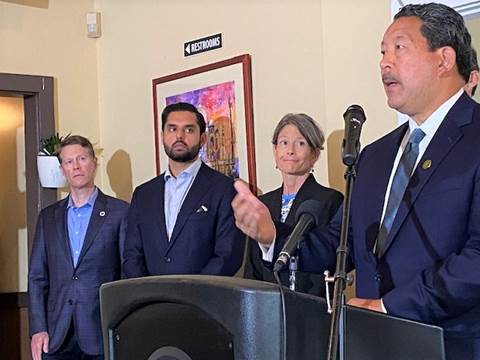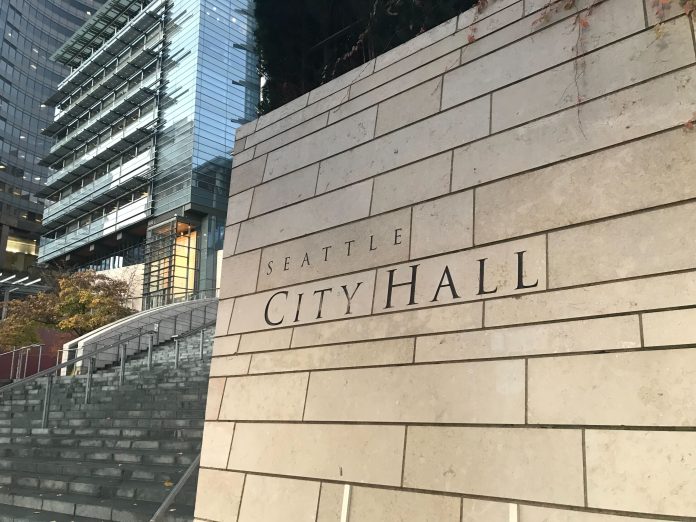The Seattle City Council has no room to spare as it approved the Seattle budget today in a 6-3 budget committee vote today. Councilmembers Sara Nelson, Alex Pedersen, and Kshama Sawant voted no. The budget goes to full council for final approval on Tuesday, and another desertion would sink the whole budget.
Sawant’s opposition came as no surprise, as the Council’s socialist firebrand has opposed every budget during her tenure, citing the need to raise taxes on the rich (particularly Amazon) in order to invest in more social programs and affordable housing. She said raising the corporate payroll tax (or the Amazon tax in her preferred parlance) could have prevented austerity and funded those programs.
“This is a brutal austerity budget, keeping in mind that this is on top of the chronic underfunding and un-funding of the needs of working people and vulnerable communities for over a decade,” Sawant said.
In contrast, Pedersen’s and Nelson’s criticism came from the right. They opposed the minor budget cuts to the Seattle Police Department (SPD) which were still far less than most other departments faced to close budget gaps. The City’s general fund faced a projected $214 million shortfall over the biennium, which had been made worse by a negative revenue forecast late in the budget process.

The mayor’s hiring plan for SPD called for hiring 125 officers and Budget Chair Teresa Mosqueda’s balancing package fully funded that plan. Still, the Council’s right wing worried SPD losing a few bells and whistles in its budget might discourage potential recruits. Nelson also referred to police funding as an obligated priority by the city charter.
“We also just have to change the narrative that helped get us to this [police] staffing shortage,” Nelson said.
SPD has long been granted a unique privilege to keep unfilled “ghost cop” positions in its budget to boost its baseline funding level in future budgets and repurpose that funding for other uses in the interim. Such budget tricks cover expenses like extra overtime spending, which the department has often failed to control or accurately track at times. Council voted to remove, or “abrogate” in official jargon, 80 of these ghost cop positions so that money can be repurposed (still within SPD) with more council oversight and fewer limitations. At least 160 ghost cop positions remain even after that move, which will have no impact on the police hiring plan or SPD’s 2023-2024 budget, but Nelson and Pedersen fretted about optics and seemed to make a slippery slope argument.
“While I appreciate all the hard work to fund the infrastructure and human services program to benefit Seattle and our district, I believe the City Council’s budget amendments went too far in weakening the Mayor’s original priority of public safety and could undermine the City’s ability to retain police officers and detectives,” Pedersen added. “I cannot in good conscience endorse a final budget that I believe, fails to learn from recent public policy mistakes on public safety and falls short on public safety for a third year in a row.”
Several councilmembers pointed out this narrative had gained traction due to deliberate efforts to stoke it by Nelson and Pedersen.
“The last thing that the city needs is people who are going to whip up rhetoric and create more fear and concern,” Mosqueda said. “I hope that folks get the chance to look through every word in this proposed budget again overnight and reconsider supporting this proposed budget.”
Councilmember Lisa Herbold, who chairs Council’s public safety committee, referred to the narrative put forth by Nelson and Pedersen as misinformation and noted an emerging positive trend in retaining and recruiting officers.
“This misinformation results in members of the public not understanding that the council has fully funded SPD’s hiring budget for the third year in a row,” Herbold said. “Minor reductions to the remaining 1% of [Harrell’s police] budget are being emphasized and exaggerated, and this is the harmful rhetoric that is likely to continue to negatively impact retention and hiring.”
Herbold quoted King County Councilmember Girmay Zahilay’s Seattle Times editorial warning public safety is being used for political point-scoring rather than solving the problem and telling the full story. She implored her colleagues: “We need to tell the full story of our budget.”
Council President Debora Juarez has sided with Council’s more conservative wing in the past, such as when she (along with Pedersen) voted against the JumpStart progressive payroll tax in 2020, but not this time.
“I loved what Councilmember Nelson said that we do have certain charter responsibilities, and public safety is one of them, but I don’t think we fell short of that charter responsibility for public safety today. I’ll be voting yes,” Juarez said. “We are now poised to be ready to implement the social justice things that should happen, and that’s the reason 2020 [protests] were so important and what we learned from it.”
Nelson’s complaints went beyond public safety. She noted business assistance was a priority for her, and lamented a $1.2 million cut to a graffiti abatement program, although much of the Mayor’s anti-graffiti plan remains funded.
“The budget rejects many of the items that would have improved quality of life and economic opportunity for the people of Seattle, such as increased funding for graffiti removal and technical assistance for women- and minority-owned businesses, a program to help small business export their projects, products, and the Seattle jobs center…”
Nelson also questioned the balancing package’s approach on homelessness, lamenting a modest adjustment to the Unified Care Team, which carries out the city’s homeless camp removals. She said this would threaten the needed regional approach to administering homelessness services. Councilmember Andrew Lewis, who chairs the homelessness committee, jumped in to dispute that, saying the budget funded the regional approach, which had the backing of the business community.
For his part, Pedersen, who chairs the transportation committee, was able to successfully add an amendment raiding a traditional transit funding source for a grab bag of bridge maintenance bonds — a long-time hobby horse of his — even as he opposed the budget vision overall. Sidewalk maintenance cuts, meanwhile, went unaddressed, even as pedestrian safety crisis worsens.
The 2022 election was not particularly favorable to candidates who boiled down the complex issue of public safety to simplified talking points around throwing more funding at police departments, tough-on-crime rhetoric, and punitive policies. Nonetheless, Nelson and Pedersen seem to be going this route. Up for reelection in 2023, Pedersen also seemed to be staking his re-election prospects on this strategy, perhaps banking on more conservative odd-year electorates to buoy him. Some potential political opponents seemed to take note.
“Pedersen doesn’t think a fully funded police budget is enough, and he wants to cut funding for prevention,” D4 resident Ron Davis tweeted. “He either doesn’t understand the basics of keeping us safe, or he doesn’t care. Time to show him the door.”
Whether any councilmembers hear Mosqueda’s plea to come together and back the balancing package ahead of the Tuesday vote remains to be seen. We will update this post with the outcome.
Update: No surprises. The vote went 6-3 as expected. Watch below for the speeches or an abridged tweet thread. The Seattle Metropolitan Chamber of Commerce backed Nelson and Pedersen’s position in their press release, agreeing that the budget amount to damaging “public safety cuts.” The Chamber argued no new progressive revenue was needed, but better prioritization of JumpStart revenue, which they opposed raising in the first place and challenged in a failed lawsuit.
Doug Trumm is publisher of The Urbanist. An Urbanist writer since 2015, he dreams of pedestrian streets, bus lanes, and a mass-timber building spree to end our housing crisis. He graduated from the Evans School of Public Policy and Governance at the University of Washington in 2019. He lives in Seattle's Fremont neighborhood and loves to explore the city by foot and by bike.


